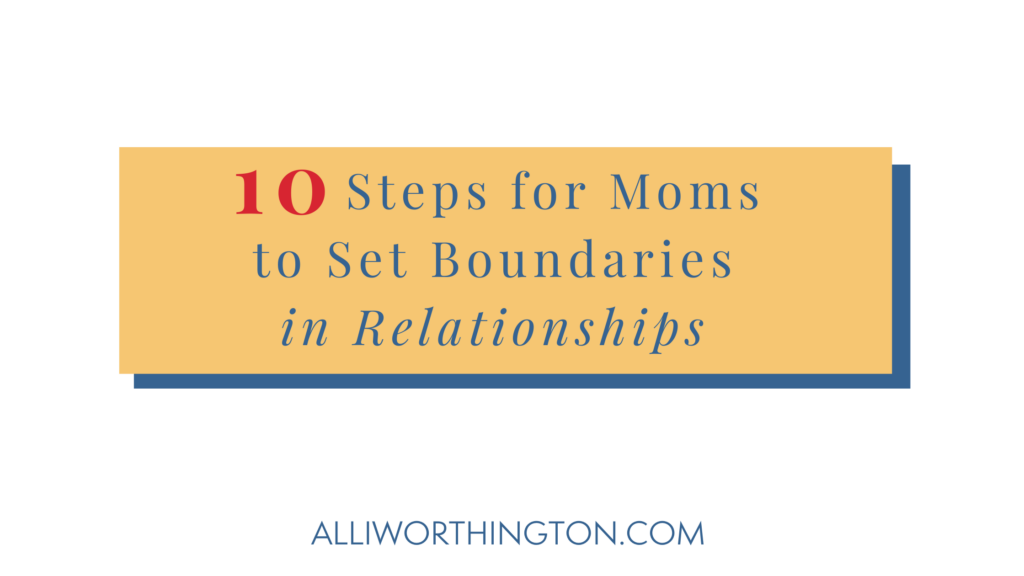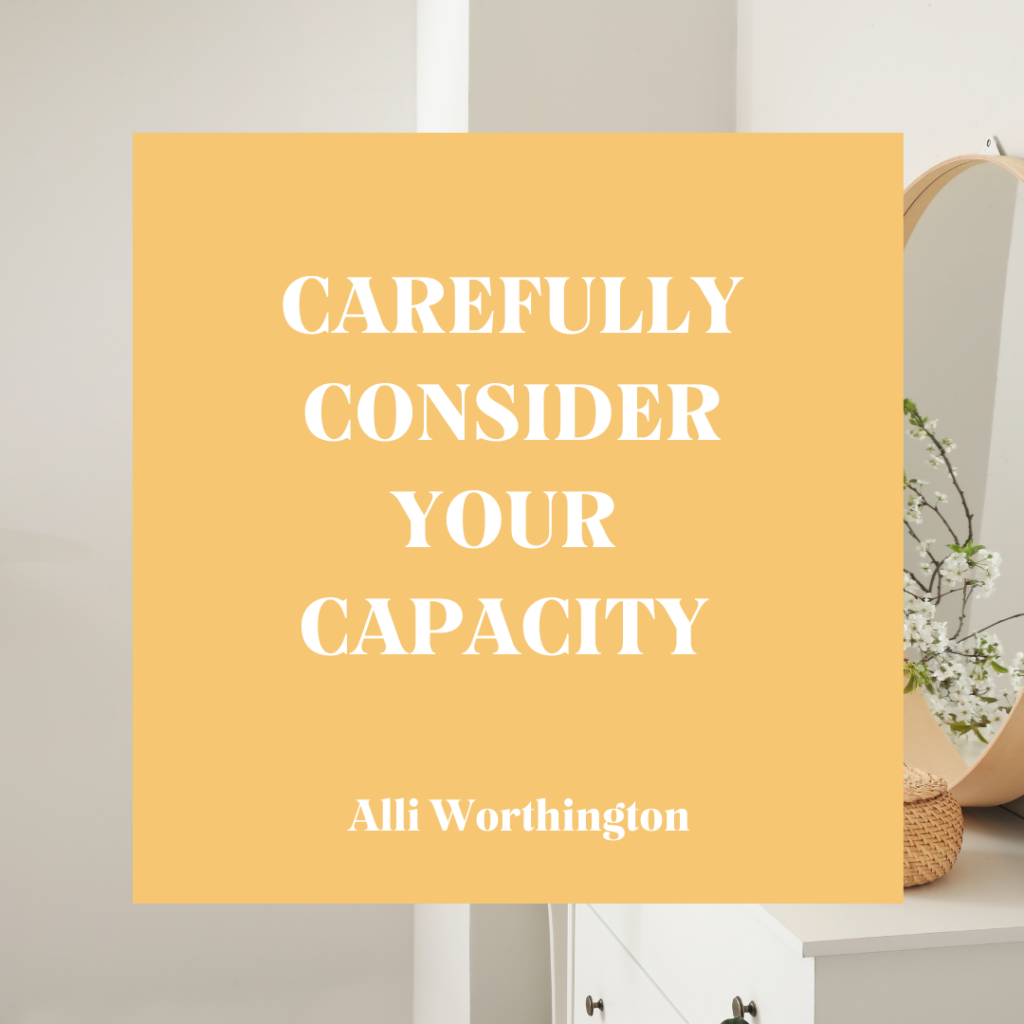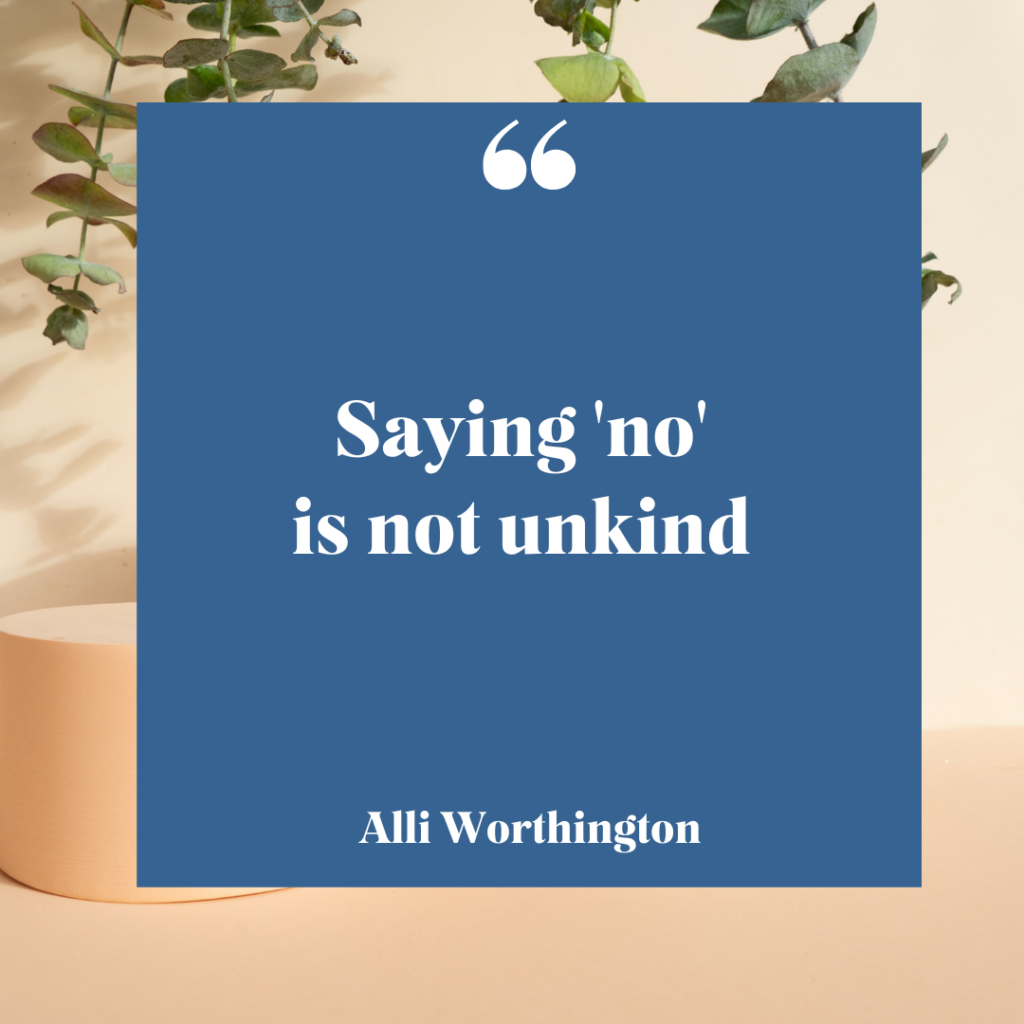You know building your brand is a crucial step to crafting your dream business. This workbook is designed with you in mind to simplify those steps.
Create a Course is Open!
10 Steps for Moms to Set Boundaries in Relationships

Hey fellow moms! We all know how hard it is to try and do everything ourselves, but sometimes we must set boundaries in our relationships to keep our sanity. Together we will dive into what boundaries are, why they’re important, and how to implement them in our relationships.
First, let’s get clear. What are boundaries?
Boundaries are routines, habits, and limits that protect our emotional health, our physical, mental, and spiritual health. This shouldn’t be overwhelming because they are already a part of us. They are foundational beliefs about what we deem to be ok and not ok. They’re our likes, dislikes, and preferences.
Why are boundaries important?
Boundaries in relationships teach those around us where our priorities lie, how we want to be treated, and what we allow them to do to us. These lines contribute to our safety and well-being and keep us from feeling overwhelmed, anxious, angry, uneasy, and overdrawn.
How to know if you need to put a boundary in place.
Practice self-awareness and pay attention to the feelings and emotions in certain situations. Have you hit a wall? Did you just say ‘yes’ when you wanted to say ‘no?’ Is something causing you to feel guilt, discomfort, pain, annoyance, or emotional exhaustion? These are people or situations pushing the limits of your boundaries.
Let’s dive into the 10 steps to set better boundaries in relationships so we can be the emotionally healthy moms we were created to be.
- Get clear on priorities
Busy moms don’t have time for just anybody. Naturally, our spouse and kids have a higher priority than others. Add aging parents, sick relatives, pets, and work, now there’s hardly time for friends and activities. Oh, and ourselves. Giving everything we have to everyone else is a highway to burnout.
Reducing our list of people we are not responsible for leaves more time and energy for those most important to us. The family member who is always asking for “a couple of bucks” or the neighbor always asking for “an emergency babysitter” is not included on the priority list. Yes, we want to be generous and helpful, but some people need to find their own solutions to their own problems.
Some examples of priorities include:
- Not working after 3pm to be present with kids when they get home from school
- No phones after 8pm, texts and calls can wait to the following day
- Deciding what people and voices get to speak into a child’s life
- Needing time alone on a weekly basis

- Be honest about capacity
If we take on too many tasks or commitments without considering our capacity, we are on our way to overwhelm, stress, and unable to do anything well or successfully. This is a fast track to burnout.
On the other hand, if we underestimate our capacity, we may miss out on opportunities or fail to meet our potential. Being honest about our ability to handle tasks, responsibilities, and commitments in a given season will help us be able to prioritize our time and energy. We can set realistic goals, manage expectations, and make informed decisions.
We’ll be more productive, efficient, and happy if we can manage our resources effectively and avoid overextending ourselves.
Examples of boundaries around capacity include:
- Volunteering with 1 organization at a time
- Each kid playing only 1 sport at a time
- Not making commitments on weeknights
- Outsourcing the house cleaning
- Define what you need and want in a relationship
Whether with a spouse, a friend, or a family member, understanding ourselves and what matters is an essential part of setting healthy boundaries. It helps us get the most out of any partnership and be thoughtful contributors to a mutually beneficial relationship.
It’s important to understand that people give and receive love in various ways. Dr. Gary Chapman, a well-known marriage counselor, wrote the best-selling book The 5 Love Languages. He explains that learning to recognize each person’s preferences can help us connect more deeply and strengthen the relationship. Take the quiz to discover your love language.
All of our relationships can thrive if we understand how we receive love and how others receive love. Dive deeper into the art of relationships with my conversation with Eric Barker. The benefits of exploring your needs and wants are wide-ranging and should not be overlooked or taken lightly!
- Make sure your partner is supportive of your boundaries
In any relationship, setting boundaries and ensuring our husbands respect them is crucial. A supportive partner will honor what matters most, including personal space, physical or emotional limits, or anything else that makes us feel safe and secure.
A supportive husband will also have our back for relationships outside of the marriage relationship. He’ll understand that we need time with our girlfriends, one-on-one time with each kid, and alone time. He’ll be there when his mom makes another comment about our parenting and when that family member asks to stay with us “for just a couple of days.”
At the same time, our spouse has their own boundaries, so we must return the respect as well. Finding a way for both to work within each other’s boundaries enables a healthier and more balanced relationship in the long run.
Our marriage is the most important relationship, and its health will impact every other relationship in our lives. Upholding EACH OTHER’S boundaries will keep it flourishing for decades to come.
Examples of boundaries in marriage can be:
- Date nights twice a month
- Scheduled intimacy (yes, I know. Moms of littles know what I’m talking about)
- A night out with their own friends once a month
- A weekday morning to themselves
- Nightly check-ins, distraction-free
- Respectful language even in conflict
- Encouragement and affirmations

- Be assertive in communicating your needs
Now that we’re clear on our priorities, capacity, needs, wants, and our spouse is on board, it’s time to tell other people about it. We now have the confidence to make sure the people around us clearly understand our boundaries.
Boundaries are ineffective if they’re not communicated well. Brene Brown said it this way, “Clear is kind, unclear is unkind.” The more concise, the more likely they’ll be respected and the more liberated you’ll feel!
Examples of how to communicate boundaries are:
“I can only stay for an hour.”
“Please let me know ahead of time if you’ll be running late.”
“This isn’t something I’m comfortable discussing right now.”
“I don’t think those types of comments are funny.”
“Please ask me before you borrow ____.”
“I respect your thoughts, but ultimately it’s my decision.”
“I understand you’re upset, but I don’t deserve to be spoken to that way.”
“I can help, but I won’t do this for you.”
Communicating boundaries in relationships can be both kind and firm.
- You are not responsible for how others respond
After you’ve communicated our boundaries to those around us, it’s ultimately up to the other person to decide how they will react. They may choose to respect our boundaries, negotiate them, or ignore them altogether. Remember, their response is not a reflection of our worth or value.
Taking responsibility for others’ reactions will leave us feeling guilty, shameful, and full of self-doubt. Which is exactly the opposite of what we’re trying to achieve! If we’re not careful, we can reinforce the cycle of people-pleasing and self-sacrifice by letting others reshape our own boundaries.
We must remain firm in our boundaries, assert our needs, and prioritize ourselves and our priorities. A healthy relationship built on mutual respect will accommodate boundaries. If not, then maybe it’s time to reevaluate how much access you give that person.
The wise and respected Lysa TerKeurst, author of Good Boundaries and Goodbyes, said a person has to be responsible with the access you have given them, and they must also match that same level of access. Otherwise, there won’t be any lasting change. You can listen to our full conversation on how to develop healthy boundaries here.
- Set realistic expectations for yourself and others
Setting realistic expectations for ourselves and others will save us a ton of frustration and disappointment through this process. We’re still going to bend and do things we don’t want to do. We’re still going to satisfy other’s needs while putting ours on the backburner. People are going to forget the boundaries we’ve communicated and will overstep lines.
Time and repetition will reap the fruit. We must do our best to avoid shifting boundaries to make others comfortable. Remember, consistency is key for everyone involved. People won’t respect boundaries if our behavior conflicts with our own boundaries. If we don’t listen to ourselves, who will?

- Don’t be afraid to say no
We must take inventory when we’re tempted to say “I’m sorry” or “Maybe, let me get back to you” when we just mean “no.” “No” is a complete sentence. And it doesn’t require an apology.
Saying “no” is not unkind. Saying “no” is not selfish. Saying “no” doesn’t make us any less of a person. In fact, when faced with difficult decisions, keeping our own priorities in focus is the best choice we can make. We must steer clear of unhealthy commitments and requests to protect our well-being.
Let’s be bold enough to clearly draw a boundary instead of leaving the other person waiting for an answer. The clarity of our communication will benefit everyone. Let’s be unapologetic about our “nos.”
- Take time for yourself every day, even if it’s just a few minutes
Everyone has different commitments and responsibilities, making it hard to find extra time for self-care. A few precious minutes each day can be just the boost needed to make it to bedtime. Those moments will help us reset and recharge so that we can face anything that comes your way.
This can be as simple as waking up 15 minutes earlier while the house is still quiet to enjoy a cup of coffee and watch the sunrise. It can be a walk around the block or listening to an uplifting playlist.
When these moments are taken daily, it’s amazing how refreshed and energized you will feel. So don’t forget to take some time for yourself – even if it’s just a few moments – and enjoy it!
For more ways to cut the guilt and add self-care to your routine, check out this blog post.

- Teach kids about boundaries in relationships
Teaching boundaries to our kids reinforces the priority and practice of protecting our own emotional, physical, and spiritual health. We are instilling in them that certain behavior is acceptable while other behavior is not.
By developing the confidence at an early age to set limits in relationships, children can avoid struggles within social interactions. They are less likely to experience anxiety, aggression, and isolation in many areas of life including school, work, and both friendly and romantic relationships. We are raising more emotionally healthy people!
By setting limits on how others can treat them, children learn to value their own feelings and needs. This is a crucial part of developing empathy and healthy relationships both inside and outside the home. If they are in the habit of putting their own boundaries in place, the more likely they are to understand and accept ours. Bonus!
Our lives are like bank accounts, they can be overdrawn! The most important thing to remember is that it’s perfectly OK to prioritize OUR needs and wants so we can show up as the healthiest moms possible. Boundaries in our relationships allow us to do just that.
Upholding the boundaries we’ve set lets others know that we take the relationship seriously. Accepted and respected boundaries in relationships allow them to grow in a healthy way.
